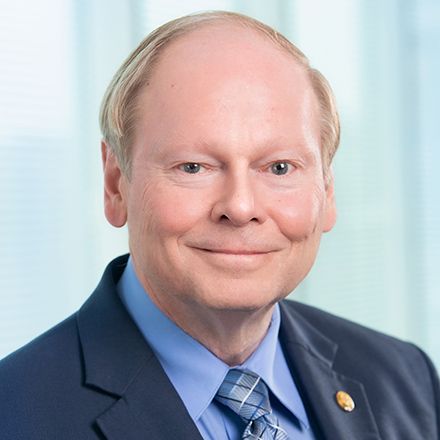Article
Retire? Not likely!
As the author proves, it&s not age but attitude that counts. So what if you outlast your office equipment, employees, and patients?
Retire? Not likely!
As the author attests, it's not age but attitude that counts. So what if you outlast your office equipment, employees, and patients?
By L.W. Ghormley, MD
General Surgeon/Blackwell, OK
Every surgeon faces the vexing question of when to retire. The issue surfaced earlier for me than for most, since I grayed prematurely, and had completely white hair by age 55. Not a day passed without a couple of patients asking how much longer I'd continue to practice. I'd take a deep breath before answering that I had no intention of retiring anytime soon.
Finally, one Saturday, I dyed and yet I lived. That Monday, I appeared in the hospital with reddish-brown hair. One of my colleagues greeted me with raucous noises. I grabbed him by the shirt collar, jammed him up against a wall in the hospital corridor and threatened to smash his nose. He got the message that I was a little hypersensitive. But my color change made a statement in this rural community: I was not retiring.
Besides, I couldn't afford it. My youngest child wouldn't graduate from college until I was eligible for Medicare. I made good money, but we had always spent freely: We skied, we boated, we traveled. We lived in a big house. When all the children were home, we drove six automobiles. I built a six-car garage. I put a full-size tennis court in the backyard. Needless to say, we weren't frugal. Surgeons have big egos.
The 10 years before I turned 65 passed uneventfully. My daughter graduated. My practice continued to thrive. I was still healthy at 65 and enjoyed working, so I saw no reason to retire for at least five more years.
Then the unexpected happened. Essentially, I outlasted everything around me. The telephone and intercom system were the first to go, followed by the air conditioning system.
Trusted employees retired. Then patients started dying off like fliesfive of them in one 24-hour period. Holes began to appear in the appointment schedule. But I was too set in my ways to reduce my staff. When I wanted something done, I could wait only a minuteno longerfor it to get done. My philosophy was "damn the expense" as long as net income was satisfactory.
The summer of my 69th year, it all caught up with me. The practice was barely making its overhead. There was no paycheck for me. I wobbled badly. Maybe the time had come to retire.
My business manager and I went over every account receivable. There were plenty; they just weren't collectible. We went over every employee and all the fringe benefits. She counseled me not to panic, that it would all work out in six months.
I panicked anyway. I made some of the hardest decisions I've ever had to make. I had never fired anyone before, but I let three people go. I hired part-time replacements who weren't eligible for fringe benefits, changed work assignments, and shrank overhead to fit the new practice size. I also found that I could wait longer than a minute when I wanted something done.
In six months, I was solvent. Looking back, my business manager was probably right. I would have been solvent anyway in six months. I regret firing those employees.
But there was still the problem of building the practice again. I modernized my parking lot and added handicapped spaces. I put in a new sidewalk out front, talked the dentist next door into doing the same, and nagged the city into doing the rest of the block. I laid new carpet, updated the furniture, and repainted.
Then I updated my skills. Intestinal stapling was now the rage. Since I couldn't find a hands-on course, I read books and articles and had the hospital get the necessary equipment.
At first, I couldn't get myself to do it. Then, one morning at 2 o'clock, desperation forced my hand. I was operating on a perforated sigmoid diverticular mass. I managed to mobilize the inflamed sigmoid colon, but couldn't see the rectum. That's when I got out the reticulated TA-55 stapler, and by blind touch stapled the "sweet spot" in the upper rectum. It worked just fine. Since then, I've stapled almost everythingand haven't had an anastomotic leak yet.
When laparoscopic cholecystectomy swept the country by storm, the hospital paid $5,000 for me to go to Houston for a weekend course. From the amphitheater seat, I watched a surgeon take only 35 minutes to rip out his 500th gallbladder. It was beautiful.
I went to the hands-on laboratory and took out a pig's gallbladder. Even though I had never done the operation on a human gallbladder, the hospital purchased $50,000 worth of equipment. Nothing happened until another surgeon, who was an expert in the technique, moved to town. I did 20 procedures under direct supervision before I mustered up enough courage to do them on my own.
Subsequently, I have done fat ones, skinny ones, tall ones, short ones. I have to convert to conventional surgery in only 10 percent of my gallbladder cases, which is a respectable rate.
So yes, I am still practicing at age 75. I've been out of medical school for 52 years now and in practice for 47. My practice brings in enough income for me to give my staff bonuses. I go to work every Monday morning happy.
Sure, I've slowed down. I close daily at 5 pm, and try to avoid more than one major operation in a single morning. The hospital has twice recruited new surgeons to replace me. They come, they go.
I may practice forever.
L. Ghormley. Retire? Not likely!. Medical Economics 2001;19:44.





